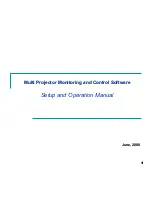
33
ePolicy Orchestrator
®
3.6 Walkthrough Guide
Deploying the Agent and Products
ePolicy Orchestrator agent
4
Instead of sending agent wakeup calls from the server to every agent, the server sends
the SuperAgent wakeup call to SuperAgents in the selected Directory segment. When
SuperAgents receive this wakeup call, they send broadcast wakeup calls to all the
agents in their network broadcast segments. This reduces network traffic, which is
beneficial in large networks where ePolicy Orchestrator may manage agents in remote
sites over lower-speed WAN or VPN connections.
Best practices information
To deploy the right number of SuperAgents to the right locations, first analyze the
divisions of broadcast segments in your environment and select a system (preferably a
server) to host the SuperAgent. Any agents that do not have a SuperAgent in the local
broadcast segment do not receive the broadcast wakeup call.Similar to the regular
agent wakeup call, the SuperAgent wakeup call utilizes the SPIPE protocol.
Ensure that the agent wakeup port (8081 by default) is not blocked by your firewall.
Figure 4-2 Broadcast wakeup calls
Server sends a wakeup call to all SuperAgents.
SuperAgents send a broadcast wakeup call to all agents in the same broadcast segment.
All agents (regular agents and SuperAgents) exchange data with the server.
Any agents without an operating SuperAgent on its subnet are not be prompted to
communicate with the server.
Agent
4
SuperAgent
1
2
Server
— Broadcast Segment—
3
Agent
Agent
Agent
1
2
3
4
1
2
3
4
Содержание ePolicy Orchestrator
Страница 2: ......
















































